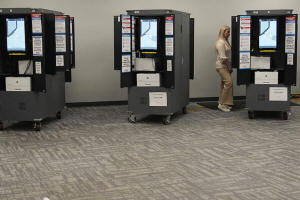Trump vows to change how elections are run. The US Constitution doesn't
give him that power
[August 19, 2025]
By NICHOLAS RICCARDI and ALI SWENSON
President Donald Trump on Monday vowed more changes to the way elections
are conducted in the U.S., but based on the Constitution there is little
to nothing he can do on his own.
Relying on false information and conspiracy theories that he's regularly
used to explain away his 2020 election loss, Trump pledged on his social
media site that he would do away with both mail voting — which remains
popular and is used by about one-third of all voters — and voting
machines — some form of which are used in almost all of the country's
thousands of election jurisdictions. These are the same systems that
enabled Trump to win the 2024 election and Republicans to gain control
of Congress.
Trump's post marks an escalation even in his normally overheated
election rhetoric. He issued a wide-ranging executive order earlier this
year that, among other changes, would have required documented
proof-of-citizenship before registering to vote. His Monday post
promised another election executive order to “help bring HONESTY to the
2026 Midterm elections.”
The same post also pushed falsehoods about voting. He claimed the U.S.
is the only country to use mail voting, when it's actually used by
dozens, including Germany, Switzerland and the United Kingdom.
Similar complaints to Trump's, when aired on conservative and
conservative-leaning networks such as Newsmax and Fox News, have led to
multimillion dollar defamation settlements, including one announced
Monday, because they are full of false information and the outlets have
not been able to present any evidence to support them.

Trump's post came after the president told Fox News that Russian
President Vladimir Putin, in their Friday meeting in Alaska, echoed his
grievances about mail voting and the 2020 election. Trump continued his
attack on mail voting and voting machines in the Oval Office on Monday,
during a meeting with Ukrainian President Volodymyr Zelenskyy.
The announcement signals yet another way that Trump intends to stack the
cards in his favor in the 2026 midterm elections, after he already has
directed his attorney general to investigate a Democratic fundraising
platform and urged states to redraw their congressional districts to
help the GOP maintain its majority in the House of Representatives.
Here's a breakdown of Trump's latest election post and why Congress is
the one entity that can implement national election rules.
Trump's post
Trump for years has promoted false information about voting, and Monday
was no exception.
He claimed there is “MASSIVE FRAUD” due to mail voting, when in fact
voting fraud in the U.S. is rare. As an example, an Associated Press
review after the 2020 election found fewer than 475 cases of potential
fraud in the six battleground states where he disputed his loss, far too
few to tip that election to Trump.
Washington and Oregon, which conduct elections entirely by mail, have
sued to challenge Trump’s earlier executive order — which sought to
require that all ballots must be received by Election Day and not just
postmarked by then. The states argue that the president has no such
authority, and they are seeking a declaration from a federal judge in
Seattle that their postmark deadlines do not conflict with federal law
setting the date of U.S. elections.

Trump also alleged that voting machines are more expensive than
“Watermark Paper." That's a little-used system that has gained favor and
investments among some voting conspiracy theorists who believe it would
help prevent fraudulent ballots from being introduced into the vote
count. Watermarks would not provide a way to count ballots, so they
would not on their own replace vote tabulating machines.
While some jurisdictions still have voters use electronic ballot-marking
devices to cast their votes, the vast majority of voters in the U.S.
already vote on paper ballots, creating an auditable record of votes
that provides an extra safeguard for election security.
[to top of second column]
|

A person votes at a polling site for the presidential primary
election March 12, 2024, in Atlanta. (AP Photo/Brynn Anderson, File)

In his post, Trump also claimed that states “are merely an ‘agent’
for the Federal Government in counting and tabulating the votes” and
must do what the federal government “as represented by the President
of the United States” tells them to do.
Election lawyers said that's a misrepresentation of the U.S.
Constitution. It also flies in the face of what had been a core
Republican Party value of prioritizing states' rights.
Thousands of elections, none under presidential control
Unlike in most countries, elections in the U.S. are run by the
states. But it gets more complicated — each state then allows
smaller jurisdictions, such as counties, cities or townships, to run
their own elections. Election officials estimate there are as many
as 10,000 different election jurisdictions across the country.
A frequent complaint of Trump and other election conspiracy
theorists is that the U.S. doesn't run its election like France,
which hand counts presidential ballots and usually has a national
result on election night. But that's because France is only running
that single election, and every jurisdiction has the same ballot
with no other races.
A ballot in the U.S. might contain dozens of races, from president
on down to city council and including state and local ballot
measures.
The Constitution makes the states the entities that determine the
“time, place and manner” of elections, but does allow Congress to
“make” or “alter” rules for federal elections.
Congress can change the way states run congressional and
presidential elections but has no say in the way a state runs its
own elections. The president is not mentioned at all in the
Constitution's list of entities with powers over elections.
“The president has very limited to zero authority over things
related to the conduct of elections,” said Rick Hasen, an election
law professor at the University of California, Los Angeles.

Courts have agreed — no presidential involvement
Parts of Trump's earlier executive order on elections were swiftly
blocked by the courts, on the grounds that Congress, and not the
president, sets federal election rules.
It's unclear what Trump plans to do now, but the only path to change
federal election rules is through Congress.
Although Republicans control Congress, it's unclear that even his
party would want to eliminate voting machines nationwide, possibly
delaying vote tallies in their own races by weeks or months. Even if
they did, legislation would likely be unable to pass because
Democrats could filibuster it in the U.S. Senate.
Mail voting had bipartisan support before Trump turned against it
during the COVID-19 pandemic and the 2020 election, but it's still
widely used in Republican-leaning states, including several he won
last November — Arizona, Florida and Utah. It's also how members of
the military stationed overseas cast their ballots, and fully
eliminating it would disenfranchise those GOP-leaning voters.
The main significance of Trump's Monday statement is that it signals
his continuing obsession with trying to change how elections are
run.
“These kinds of claims could provide a kind of excuse for him to try
to meddle,” Hasen said. “Very concerned about that.”
___
Associated Press writer Eugene Johnson in Seattle contributed to
this report.
All contents © copyright 2025 Associated Press. All rights reserved |